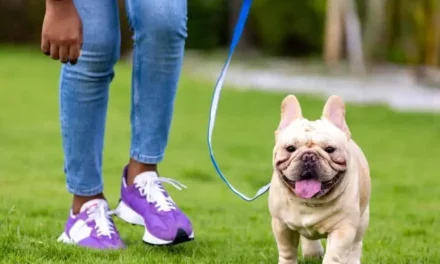Are French Bulldogs aggressive

French Bulldogs are inherently non-aggressive, provided they are nurtured and trained properly from an early age to mitigate any potential aggression.
Here’s the upside:
Raising a Frenchie shouldn’t pose significant challenges!
These dogs are intelligent, affectionate, and remarkably devoted. Their primary goal is to please their owners.
These clever little canines grasp things rapidly. Through positive, reward-oriented training methods, your Frenchie will exhibit good behavior in no time!
It’s crucial not to reprimand your sensitive Frenchie for missteps! Instead, ignoring such instances and rewarding positive conduct proves far more effective.

Early socialization also holds tremendous importance. When introduced to people, children, and other animals during their formative stages, Frenchies tend not to exhibit aggression towards them as they mature.
In Short:
French Bulldogs typically display non-aggressive tendencies. Their even-tempered demeanor and playful disposition usually foster compatibility with both animals and people
Signs of Aggression in French Bulldogs
No dog is immune to occasional behavioral issues as they, like humans, experience emotions. Dogs, too, can feel nervous, scared, or uncomfortable, leading them to display behaviors that might be less desirable.
Understanding and tolerating such behaviors to a certain extent is important. However, it’s crucial to discern when such behavior becomes a consistent pattern or inherent trait and take steps to prevent it.
While French Bulldogs might be small in size, aggressive tendencies in them can pose significant challenges. Recognizing signs of aggression is essential to address any potential issues early on.
Identifying Aggressive Behavior
The most common indicators of aggression in French Bulldogs include:
- Growling
- Snarling
- Stiff body language
- Biting
It’s important to note that such behaviors are typically normal in very young puppies, and they often grow out of them. However, if these behaviors persist into adulthood, they should raise concerns and be addressed promptly.

Potential Causes of Aggression
Understanding the root cause of aggression in French Bulldogs is the initial step in managing it. Various triggers can manifest aggression differently in these dogs:
- Fear-based aggression often involves hiding, attempting to escape, or avoiding direct contact with unfamiliar people or dogs. Lack of proper socialization, especially in younger dogs, can contribute to this behavior.
- Loyalty, while a commendable trait, might lead to aggression towards strangers. Frenchies may display protective behaviors towards their owners or territory.
- Resource guarding can provoke aggression, whether it’s protecting their space or food. This behavior can pose risks, especially in households with children, and should be addressed promptly.
Addressing Aggression Through Socialization
Proper socialization plays a crucial role in preventing aggression in French Bulldogs. Introducing them to diverse experiences, people, and animals from an early age is key to fostering confidence and reducing potential aggression.
Here are valuable tips for effective French Bulldog socialization:
- Start socialization early, even before full vaccination. Carry your Frenchie wherever you go to expose them to different environments.
- Introduce your pup to various animals beyond just fellow canines, including cats, birds, or larger animals like horses and cows.
- Familiarize your Frenchie with different modes of transportation and encourage interactions with children in a controlled, safe setting, teaching both kids and dogs appropriate behavior.
Prioritizing early and extensive socialization significantly contributes to nurturing a well-adjusted, friendly, and well-behaved French Bulldog

Are French Bulldogs Aggressive Towards Other Dogs?
Frenchies have been nurtured as companion dogs since the 19th century, fostering an amiable disposition towards most people. But what about their interactions with other dogs?
Generally, French bulldogs tend to get along well with most dogs, especially those within the same household. Hence, there’s typically no need to fret about introducing another canine companion into your home.

Raising dogs together from a young age is advisable to mitigate potential jealousy issues between them. Frenchies, like many dogs, relish being the focal point of attention. Consequently, introducing a new puppy and lavishing it with attention might provoke conflicts.
What about encounters with other dogs outside your Frenchie’s immediate circle?
If your pooch has been adequately socialized, interactions with other dogs should pose no significant concerns. Introducing your Frenchie puppy to various canine friends early on is key to fostering positive interactions.
Ensure to acquaint your French Bulldog with as many fellow dogs as possible during their early development stages
Are French Bulldogs Agressive with Children?

Welcoming a French Bulldog into a home bustling with the laughter and exuberance of children can prove to be an enjoyable journey. These affectionate and easygoing dogs often thrive amidst the joyful chaos of family life.
Introducing a Frenchie to children requires thoughtful consideration. Allotting time for the dog to acclimate to the younger members of the household, teaching kids to be gentle and considerate, and incorporating enjoyable training sessions are vital steps.
With patience and affection, the bond between French Bulldogs and children can evolve into a heartwarming connection that enhances the fabric of family existence.
Why Frenchies Are Ideal Companions for Children
Laid-Back and Friendly Nature
French Bulldogs uniquely blend a calm and amiable temperament in the realm of canine companionship. Their relaxed demeanor creates a tranquil atmosphere, well-suited for the vibrant dynamics of family life.
Children see them not just as pets but as gentle companions adept at navigating the daily flurry, bringing a sense of peace to the household.
Instilling Responsibility
Owning a French Bulldog becomes a valuable lesson in responsibility for children. The daily routine of caring for these furry friends, encompassing feeding, walks, and overall well-being, nurtures a sense of accountability in youngsters.
This commitment fosters a strong understanding of caring for others and encourages empathy, extending beyond the realm of furry companionship

Do French Bulldogs Display Aggression Towards Cats?
Frenchies typically establish good relationships with cats they have grown up with. Even if a cat isn’t present at home, introducing your Frenchie to neighborhood cats is possible.
Initially, introducing your puppy to a cat from a safe distance is advisable. Over time, allowing supervised playtime can boost your French Bulldog’s confidence around cats and minimize the potential for aggression or chasing behavior.
Compared to other dog breeds, French bulldogs generally possess a lower inclination for chasing. They are less prone to pursuing other animals.
What To Do If Your Frenchie Is Aggressive:
- Identify Triggers and Patterns: Observe and identify specific triggers or patterns that provoke aggression in your Frenchie. Understanding these triggers can aid in managing or avoiding such situations.
- Create a Calm Environment: Maintain a calm and stress-free environment for your French Bulldog. Reduce potential stressors and ensure they have a comfortable and safe space.
- Consult a Veterinarian: Aggression in dogs can sometimes stem from health issues or discomfort. Schedule a visit to the vet to rule out any underlying medical conditions contributing to the behavior.
- Consistency in Training: Remain consistent with training techniques. Use positive reinforcement methods consistently to reinforce good behavior and discourage aggression.

- Behavior Modification Techniques: Implement behavior modification techniques recommended by professionals or trainers to address aggressive tendencies. This may involve desensitization exercises or controlled exposure to triggers under supervision.
- Exercise and Mental Stimulation: Ensure your Frenchie receives adequate physical exercise and mental stimulation. Engaging activities and regular exercise can help alleviate stress and reduce the likelihood of aggressive behavior.
- Avoid Punishment: Refrain from using punishment as a means to correct aggression. Punishment can exacerbate fear or anxiety, leading to further behavioral issues.
- Monitor and Supervise Interactions: Monitor interactions with other animals, children, or strangers closely. Supervision can prevent potential conflicts and allow for prompt intervention if needed.
- Seek Support Groups or Communities: Joining support groups or online communities of Frenchie owners might offer valuable insights and experiences in handling similar behavioral issues.
Remember, addressing aggression in French Bulldogs often requires a multifaceted approach and patience. Seeking guidance from professionals and implementing consistent, positive training methods is crucial for managing and mitigating aggressive behavior.

Addressing Behavioral Challenges in French Bulldogs
Playing Behavior:
French Bulldogs have a penchant for enthusiastic play, which might seem rough, resembling fights when they play among themselves. However, this exuberance can pose risks around children. Encouraging your pooches to differentiate playfulness from aggression is essential. Socialization plays a key role in curbing rough behavior in puppies.
Reasons for Rough Play:
- Learned behavior from other dogs
- Overexcitement
- Attempt to establish dominance
- Playfulness extending to roughness with people When play becomes overly intense, interrupt and halt the rough interaction. This helps them learn to moderate excitement during playtime.
Jumping Behavior:
Frenchies are affectionate and might jump up on people as a greeting gesture. While you might tolerate it, visitors may find it bothersome. Strategies to deter jumping behavior include:
- Avoiding physical interaction until their paws are on the ground.
- Rewarding and praising them when their paws touch the floor, reinforcing the desired behavior.
Leash Pulling:
Some French Bulldogs tend to pull on the leash while outdoors, especially if not trained early. Address this behavior by consistent training methods from puppyhood. Utilizing modern leashes like the Halti leash can aid in minimizing pulling tendencies.
Response to Commands:
Frenchies can be independent-minded at times, responding selectively to commands. To improve their responsiveness:
- Maintain consistency in commands and training.
- Engage in activities to expend excess energy.
- Reinforce basic commands, even if they seem to have mastered them.
- Stay calm and assertive while issuing commands, using hand signals alongside verbal cues.

Managing Aggression:
French Bulldogs are generally friendly and affectionate but might display aggression in specific circumstances. Proper management and training can effectively mitigate aggressive tendencies in these dogs.
Biting Behavior:
While Frenchies might occasionally nip during play, it’s typically not a cause for concern as they’re not inherently aggressive biters.




